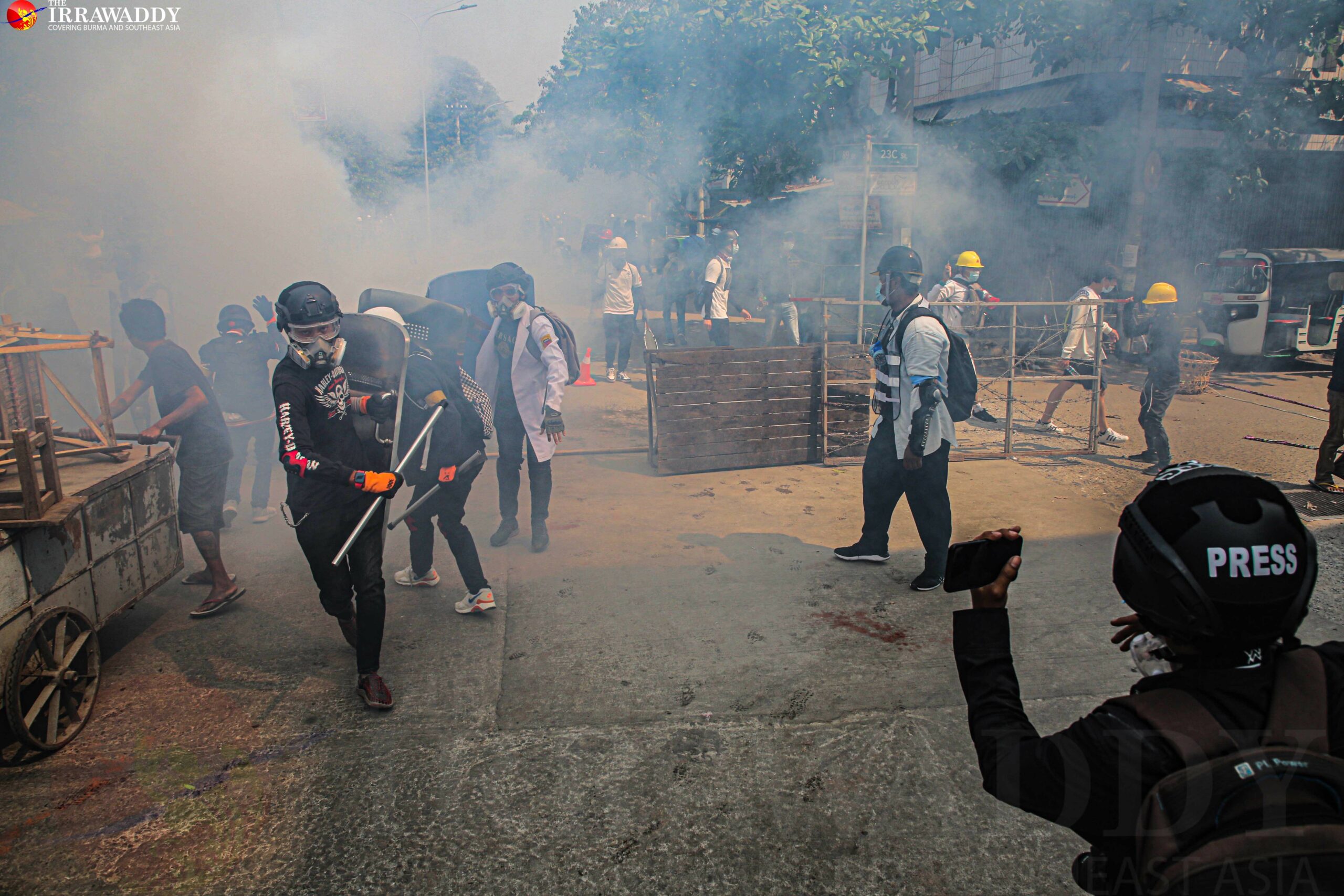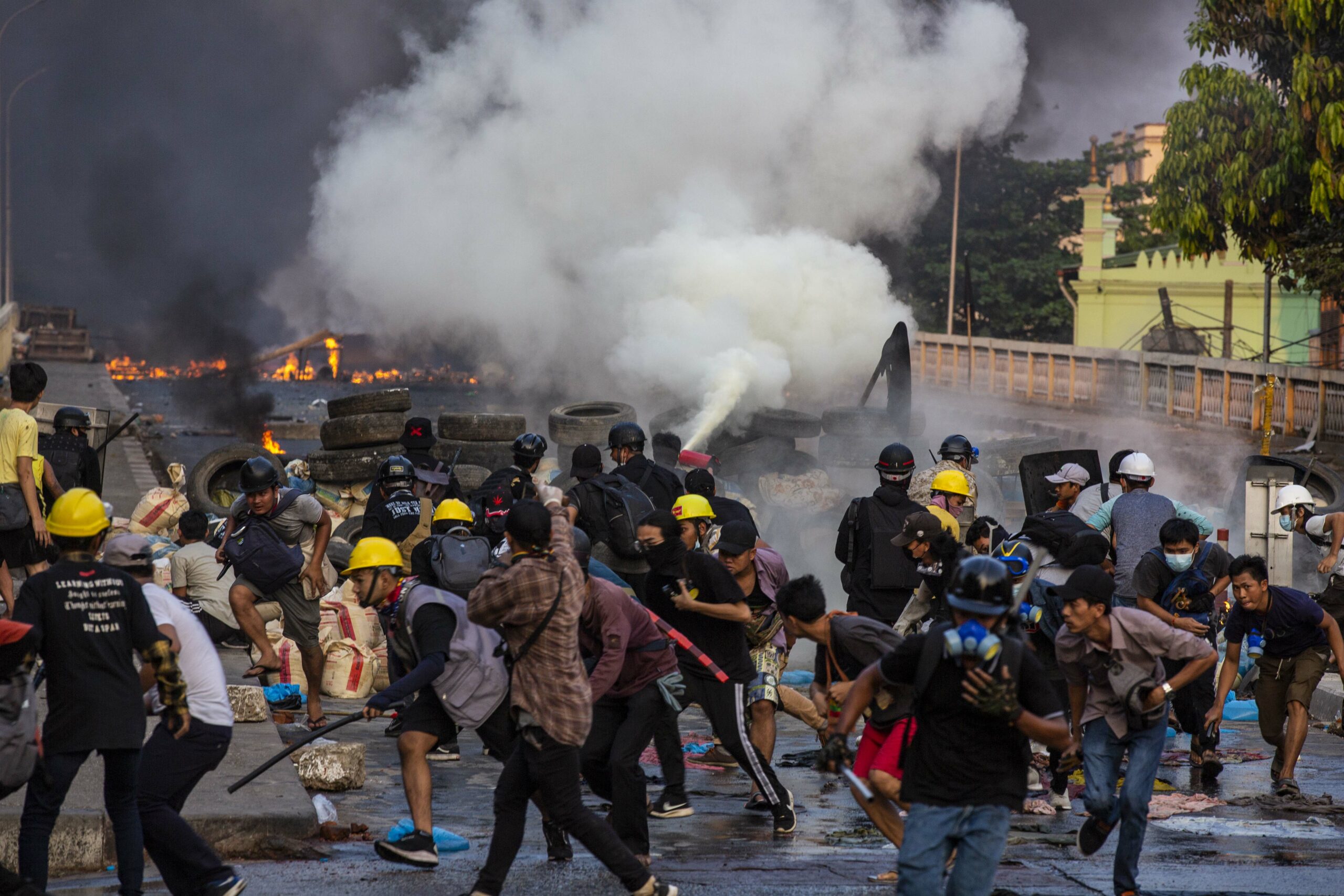As it confronts the sheer scale of the anti-regime movement, the military regime has identified as one of its main enemies the news media, in particular those journalists whose work daily exposes the true colors of the coup leaders—their cruel, inhumane and immoral acts against the entire population. Their work has made the media an enemy of the regime.
Since Feb. 1, when the military led by Senior General Min Aung Hlaing seized power, journalists across the country have been tirelessly working to disclose the truth—which is the first and foremost obligation of their profession.
Independent publications and their journalists across the country have been meticulously covering the cruel killings, brutal crackdowns, arbitrary arrests, looting and all of the other human rights violations committed by the regime’s soldiers and police since the coup.
Hour by hour, they have kept the world informed of what’s going on in every corner of Myanmar through their websites and social media pages. As a result, the international community has come to understand the military regime’s atrocious persecution, naked lies and political repression, as well as the people’s determination to rid the country of the military dictatorship. For the citizens of Myanmar, the journalists’ work not only keeps them informed, but encourages them to join in the national spirit of this anti-regime movement.
For the first month or so after the coup, journalists freely covered the anti-coup protests, wearing helmets and vest emblazoned with the word “PRESS”, wearing their press cards around their necks and not bothering to hide their cameras. Initially, the security forces didn’t target the press while they were cracking down on protesters in the streets. But it didn’t take long for that to change.

Before long, the regime’s forces started targeting journalists on the streets as they cracked down on the protests. To date, the regime has arrested more than 40 journalists reporting on anti-coup protests and the resulting crackdowns nationwide. Some of them were later released, but 18 remain detained to date, of whom 10 have been charged under Article 505(a) of the Penal Code.
The most recent victims were Ko Aung Thu Ra and Ko Than Htike Aung of the BBC Burmese Service and the Mizzima news organization, respectively. Last Friday, the two reporters were arrested by plainclothes police in Naypyitaw while gathering news about a court hearing of detained National League for Democracy (NLD) patron U Win Htein. On the same day, another freelance reporter for Mizzima was arrested by police in Bhamo, northern Kachin State. And on Sunday, a reporter for DVB was arrested in Naypyitaw. On Monday, Ko Aung Thura was released but his fellow reporter from Mizzima was still in detention.
The regime took its crackdown on the media to another level on March 8. On that day, it went beyond detaining journalists and revoked the licenses of five media outlets: 7Day, Democratic Voice of Burma, Myanmar Now, Mizzima News and Khit Thit Media.

On that day and subsequent days, the regime’s soldiers and police raided the offices of Myanmar Now and Mizzima News in Yangon and confiscated property. Luckily, staff had stopped working in their offices, having anticipated such raids, so no one was detained. However, the chief editor and co-founder of another media outlet, Kamayut Media, were arrested during a raid on its offices. A few days later, the regime sued The Irrawaddy under Article 505(a) of the Penal Code. It was the first case of a lawsuit being opened against a media organization as a whole, as opposed to individual journalists.
The regime’s announcements, raids and lawsuit have forced almost all independent journalists into hiding, and the rest are keeping a low profile.
In fact, soon after the military staged the coup, its Ministry of Information ordered media not to use the phrase “coup d’état” to describe the military’s “takeover”, and not to refer to it as the “military regime” or “military council.” However, all independent media continue to use those terms in defiance of the regime’s warning.
Based on what my journalist friends—editors and reporters of newspapers as well as digital publications—have told me, the number of journalists who have gone into hiding appears to be in the hundreds across the country. Many others are laying low. My friends are still talking to me via phones but don’t dare to give a hint of their whereabouts. They tell me they are working from their hideouts. Their appearance in public would spell the immediate end of their freedom. Some have moved to remote areas or are even trying to flee the country.
Since the coup, all independent print newspapers have ceased publishing under the regime’s pressure and raids. The only print newspapers now available in Myanmar are one military-owned and two state-run newspapers that are entirely controlled by the regime. All media outlets’ offices are closed indefinitely for fear of raids.
After the semi-civilian government began easing the previous regime’s draconian media censorship rules a decade ago, Myanmar’s private media had an opportunity to expand their presence, though the number of outlets is still not that high. Some journalists put the number at around 2,000 across the country. Not all are truly independent, however; some of their journalists work for state-run media or media outlets that are close to the generals and those in power.
Several hundred journalists who work for mainstream media in big cities and other publications in ethnic states have industriously covered the anti-coup movement and the regime’s crackdowns since Feb. 1. In fact, it’s quite a small group to be covering such a flood of news events, which have been occurring day and night.
That small army of independent media and journalists can no longer work freely in the open; nonetheless they continue to work from their hideouts, contacting sources or even managing to sneak out to gather news clandestinely and serve as eyewitnesses to the unfolding events.
The public is well aware of this difficult situation for the media. In recent days, citizen journalists have emerged to play an important role to supplement the work done by professional reporters in the weeks since the coup. They have tried to take photos and videos of the ongoing anti-regime movement and the regime’s human rights violations. They send these news items and information to various media groups, which later publish them for people across the country and the world to see.
These days, we no longer see journalists openly covering protests on the streets. Those who do are targeted and detained right away, as in the cases of the BBC and Mizzima reporters.
The regime has seemingly added journalists to its ever-growing list of people targeted for arrest. With many reporters having gone underground, this effort has been stymied somewhat for now.
But all professional journalists are now on the list of the regime’s main enemies, together with the Generation Z protesters, civil servants who have joined the civil disobedience movement (CDM), active members of the NLD led by ousted leader Daw Aung San Suu Kyi, and other political and rights activists.
Independent journalists are simply documenting the crimes against humanity committed by the military regime led by Senior General Min Aung Hlaing. But in the eyes of the coup leaders, this is a serious crime against the military regime.
It is a serious job. All who do it are in danger, as they have made themselves prime targets of the atrocious regime, simply by wielding cameras, mobile phones, recorders, pens and notebooks.
I have no doubt that the world and the people of Myanmar appreciate the professionalism with which they are carrying on with their work, which is making such a vital contribution to this Spring Revolution and demonstrates their conviction and commitment to the truth and their loyalty to the people of Myanmar. In my own view, they are both making and recording history, a crucial task in ensuring a brighter future for the county.
Naing Khit is a commentator on political affairs.
You may also like these stories:
Two More Australians Arrested by Myanmar Military Regime
Myanmar Regime Outlaws Committee Representing Ousted Lawmakers and Its Associates
Shan Villagers Flee Myanmar Military Raid after Four Soldiers Die

















